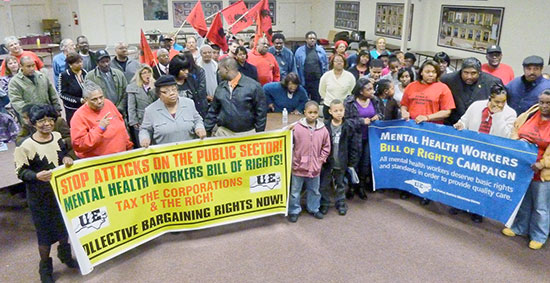North Carolina labor/civil rights coalition defends public sector
By
Dante Strobino
Goldsboro, N.C.
Published Feb 10, 2011 9:26 PM
|
Mental health workers join community activists
to defend public services and jobs.
WW photo: Dante Strobino
|
State mental health workers from across North Carolina spoke out before a
“listening panel” at the Rebuilding Broken Places Community
Development Center in Goldsboro on Feb. 5. They discussed the impact of
inadequate working conditions and the policies and budget decisions that affect
delivery of quality care for people with psychiatric and developmental
disabilities.
Rev. Dr. William Barber II, president of the North Carolina chapter of the
NAACP, chaired the meeting. Community leaders, patient advocates, clergy, labor
leaders, state legislators and international human rights experts attended.
The event, which was co-hosted by the North Carolina Public Service Workers
Union, United Electrical Workers Local 150 and the NAACP, was the public launch
of a major statewide Labor and Civil Rights Coalition in Defense of the Public
Sector. This coalition grew out of the fight for public workers’
collective bargaining rights, the campaign by UE 150 for a legislative Mental
Health Workers Bill of Rights, and the growing struggle against the
state’s looming $3.7 billion budget shortfall.
All these issues disproportionately affect African-American and Latino/a
residents and workers. Budget cutbacks by Gov. Beverly Perdue and the state
legislature could result in layoffs of up to 21,000 state workers and have
devastating effects on the public service infrastructure — unless a
significant fightback is waged.
The coalition is demanding that the state fill the budget gaps not by cutting
workers and services but by taxing wealthy individuals and corporations.
The listening panel included Rep. Larry Bell; Sen. Doug Berger; Ajamu Baraka,
director of U.S. Human Rights Network; James Andrews, president of the N.C.
AFL-CIO; Clayola Brown, national co-chair of the NAACP Labor Committee,
president of the A. Phillip Randolph Institute and former vice president of the
Coalition of Black Trade Unionists; Reuben Blackwell, Rocky Mount City
Councilperson; and Vicki Smith, director of Disability Rights N.C.
Della Singleton, a health care technician and UE 150 steward, gave the opening
testimony. She spoke from her hospital bed where she was being treated for a
bite by a patient, which exposed her to hepatitis. Her serious injury could
have been prevented if her employer, the Caswell Developmental Center, had
provided updated hepatitis and tetanus shots; she had not received these since
1994.
“They don’t care about us. This should have never happened,”
stated Singleton.
A worker from Cherry Hospital, UE 150 Chapter President William Newsome read
testimony for Todd Smith, a registered nurse, who was forced to work overtime
and could not attend: “Employees are threatened when they have already
worked 12-13 hours with no break and told to work 16 hours or more —
‘or else.’ Yet if that same employee were to nod off after 16
hours, he/she would be fired.”
Workers from Dorothea Dix Hospital, Central Regional Hospital and Murdoch
Developmental Center also testified.
Baraka said, “What we have witnessed tonight is something that is
occurring across this country and particular in this southern region. The
persistent, systematic assault on the dignity of public workers and people is
part of the direction of this country. It is going to require a collective
response from all of us to turn it around.”
A legislative Mental Health Workers Bill of Rights is needed to institute fair
standards for public sector workers to provide quality care in a state that
denies them collective bargaining rights which would help establish enforceable
standards. The working conditions place an undue burden on workers who are
forced to work overtime in facilities that are understaffed. They earn wages
that cannot support their families. It was pointed out that the annual median
wage at all these facilities is less than $28,000; yet the workers live in
areas that require more than $44,000 per year to sustain a family.
Moreover, the workers are blamed for the systemic problems of the Department of
Health and Human Services, which include lack of adequate funding and resources
by the state.
“How a society treats its people who suffer mental illness is a measure
of that society,” said Rev. Barber. “How our society takes care of
the people who take care of our friends and neighbors with mental illnesses is
also a measure of that society. In North Carolina we need a Mental Health
Worker Bill of Rights, and state workers need collective bargaining rights.
Anything less is just plain wrong and unjust,” he stressed.
On Feb. 12 the Labor and Civil Rights Coalition in Defense of the Public Sector
will join in the fifth annual Historic Thousands on Jones Street People’s
Assembly Mass Demonstration. Together with thousands of community members and
workers from the HKonJ organizations, they will participate in a march to the
North Carolina Legislature where they will deliver a 14-point People’s
Agenda. (See www.hkonj.com.)
Articles copyright 1995-2012 Workers World.
Verbatim copying and distribution of this entire article is permitted in any medium without royalty provided this notice is preserved.
Workers World, 55 W. 17 St., NY, NY 10011
Email:
[email protected]
Subscribe
[email protected]
Support independent news
DONATE


